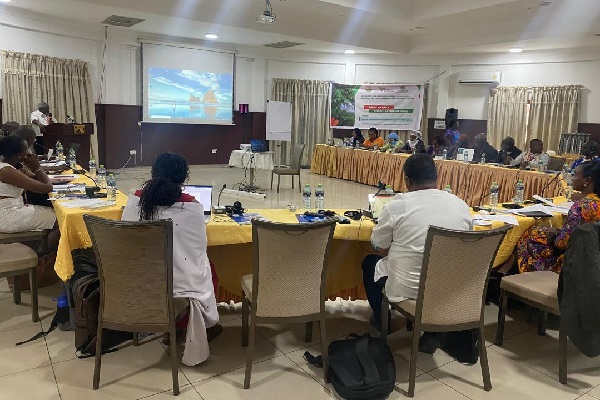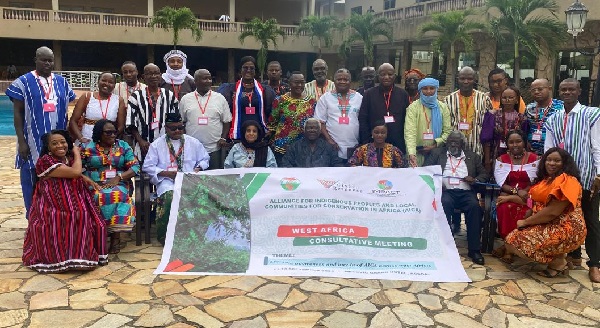
Indigenous Peoples, Communities need more recognition in conservation efforts – Prof. Oteng-Yeboah
A renowned Ghanaian biodiversity expert, Professor Alfred Oteng-Yeboah, has called for greater recognition of Indigenous Peoples and Local Communities (IPLCs) in biodiversity conservation efforts, highlighting their historical stewardship of natural resources.
He said IPLCs have sustainably managed their environments for generations, maintaining biodiversity while securing food and livelihoods.
However, he noted, despite their participation in international conventions, the IPLCs often lack the financial resources to implement conservation programmes.
Speaking at the Alliance for Indigenous Peoples and Local Communities for Conservation in Africa’s (AICA) first West Africa Regional Consultative Meeting on September 11, 2024, in Accra, Prof. Oteng-Yeboah emphasised that IPLCs do not need lessons on conservation but rather adequate funding to support their initiatives.
Rationale for the workshop
The three-day meeting, which will end on Friday, September 13, is hosting about delegates from 13 West Africa, the National Focal Points, members of the AICA Executive Committee, and Steering Committee as well as a representative from International Union for Conservation of Nature (IUCN) in Ghana.

The overall objective of this meeting is to review a proposed governance structure of AICA, agree on a self-organised network that will engage with AICA and support the implementation of the African Protected Areas Congress (APAC) Kigali Call to Action, APAC IPLC strategy and the Namibia Community Communique.
The consultative workshop will also allow participants to hold in-depth discussions and provide feedback on AICA, its rationale, strategic objectives, governance structure, and Secretariat based on a presentation to be made by AICA.
The programme was funded by the Tenure Facility and the Indigenous Movement for Peace and Conflict Transformation (IMPACT).
Sustainability
For Prof. Oteng-Yeboah, "The question of whether IPLCs need lessons in conservation is rhetorical," adding that "They (IPLCs) have the knowledge, but what they lack is access to sufficient funding."
He further criticised the inadequate funding from multilateral sources like the Global Environment Fund (GEF), urging African governments and organisations to prioritise IPLC activities in national plans.
He called for the establishment of a formal network for West African IPLCs and stressed the importance of securing additional funds from initiatives like Biodiversity Finance Initiative (BIOFIN), and Community Development and Knowledge Management for the Satoyama Initiative (COMDEKS) to bolster conservation efforts.
Prof. Oteng-Yeboah further urged African IPLCs to remain proactive in global negotiations and work closely with state actors to ensure their efforts in biodiversity conservation are fully supported.

He also encouraged IPLCs in Africa to work together as a formidable group to influence global decisions, particularly on funding.
“The African chapter of IPLCs must be very proactive,” he said, adding “IPLCs in each African country must be properly registered and empowered.”
AICA’s struggles
The Chairman of the Steering Committee of the AICA, Mr Malidadi Langa, in his opening remarks said AICA is a continuation of struggles by African IPLCs to address their historical and present grievances for emancipation, self-determination, and human dignity; struggles that can be traced back to the brutal slave trade era.
"Present day fortress conservation models continue to burden African IPLCs, as they suffer systematic landlessness, denial and criminalisation of access to natural resources, and human-wildlife conflicts, which often result in brutalisation, injuries, and death without compensation," he noted.
For him, "Africa’s IPLCs share the same conservation challenges; pervasive poverty, livelihood fragility, biodiversity loss, and climate change,” linking it to the continent’s shared colonial history and added that “conservation practices across the continent have impeded effective action against these issues. Unity of purpose, collective agency, and action are required to address them."
Mr Langa was of the view that "For far too long, Africa’s IPLCs have not been at the decision-making table, and their interests have been systematically sidelined.”
Objectives
Sharing insights into the consultative workshop, the host, who is also the Coordinator for Forest Watch, and Head of Programmes for Civic Response, Mr Albert Katako, said the meeting would afford the participants the opportunity to develop an implementation plan for the AICA growth trajectory in the region including clear milestones and outcomes in the short-term, medium term, and the long term.
Similarly, he indicated, the workshop was intended to look at and discuss a whole range of issues relating to the institutional development of AICA, including proposals on legal entity status, Secretariat location, rules of engagement with other organisations, partnership building, resource mobilisation and holding of AICA’s inaugural Annual General Assembly.
Additionally, Mr Katako noted, participants would use the occasion to thoroughly review the AICA strategy to see if it aligns with the interests and issues that IPs and LCs are facing in West Africa in order to better understand key issues and concerns of indigenous people (IPs) and local communities (LCs) in the region; for instance, the on-going conflict in the Sahel Region.
